
Welcome to Transform’s Founder Spotlight Series, an exciting journey into the minds of innovative leaders who are disrupting the now and next of work.
In each Q&A-style article, we’ll introduce you to founders like Coco Brown, Founder and CEO of Athena Alliance, Inc., who are redefining the boundaries of their industries with forward-thinking ideas and transformative approaches.
About Coco
I am a four-time entrepreneur. I built my first product in 1996 when I was twenty-five years old. It was a company HR starter kit – a fully automated HTML-based digital employee handbook and five self-paced HTML-based manager training modules. I pitched to just one VC and found the experience lonely and discouraging enough that I did not try again. I sold my product outright to an early pioneering company in the HR BPO space; an early precursor to companies like Justworks, Gusto, and Rippling today. In 2002, I became the “re-founder” of a company for which I had previously been the VP of Professional Services. We had crashed in the dotcom bust, plummeting from $100m in revenue to just $10m in 18 months. I was asked to become the third owner of the company and pull the Phoenix from the ashes as its President & COO. I rebuilt the business to over $50m in revenue. It was later sold to IBM. My third entrepreneurial venture is a consultancy through which I provide strategic advisory services to CEOs and executive teams. Finally, I started Athena Alliance, first as a non-profit, which I transformed into a commercial company in 2019, with our launch in January 2021.
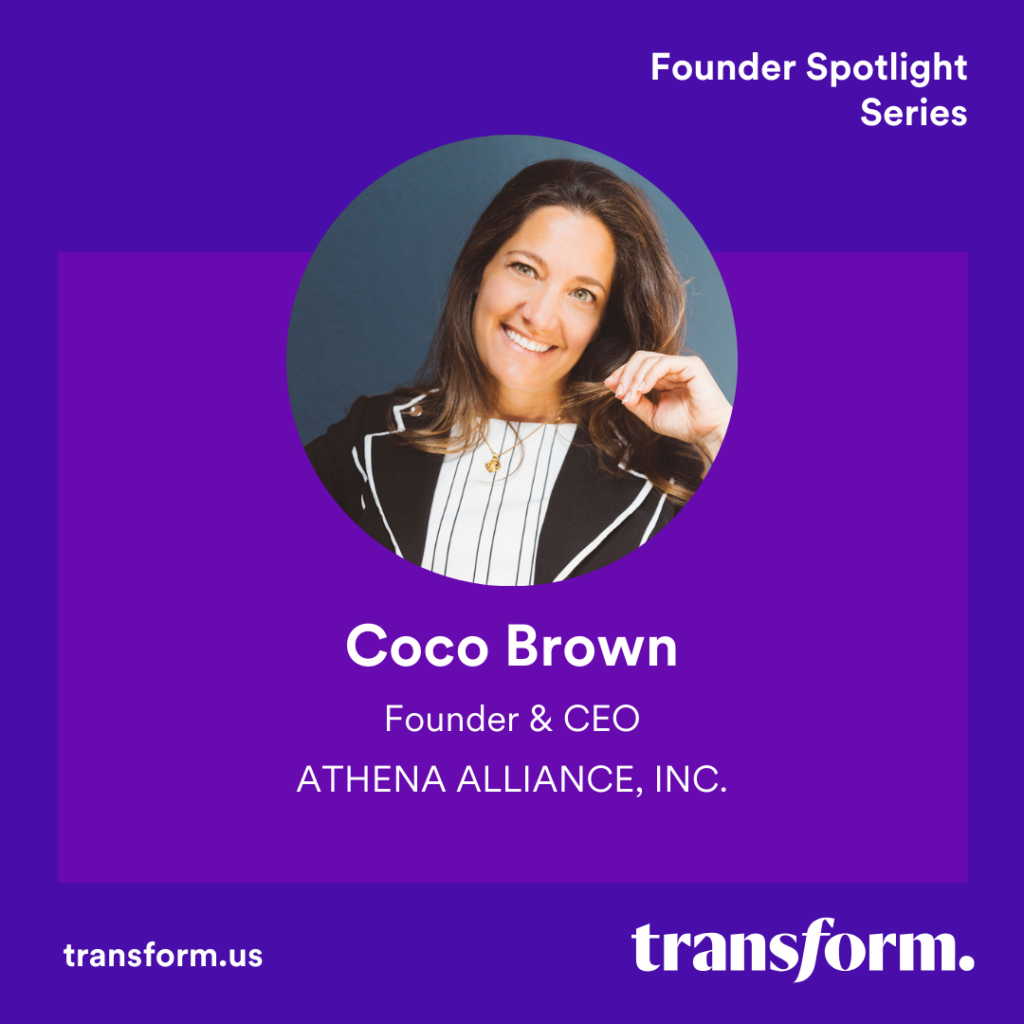
About Athena Alliance, Inc.
Athena is a platform for community, content, and coaching helping women to excel and advance into the highest levels of leadership – from Sr. Director to Board Director. Among our offerings, Athena works with People-First companies to design highly customizable learning experiences for leaders in support of a company’s efforts to advance, retain, and recognize top talent. Our modern approach to executive development is inclusive for all, but has a special emphasis on advancing women.
The Startup Journey
Q: What gave you the idea to start Athena Alliance, Inc.?
A: In 2005, I was running Taos, a deeply technical IT Infrastructure professional and managed services business. I felt quite lonely as a woman who had no formal technical training and was quite young (I was 34 at the time). I like to say “Athena has many mothers”. I looked for and found the other few women around me at the time, and launched a dinner group at the suggestion of one of them. We were an unnamed bi-monthly gathering of women Chief Information Officers (CIOs); 8 of us at first. I hosted these dinners for 10 years through 2015. By then we were over 150, no longer just CIOs, but any C-Suite function, and their next level down. At that point, I was building my consulting practice, but looking for what my next product company might be. This group of women inspired me, starting with cracking the code to get them on boards, and then expanding into helping them build a great portfolio of impact into their second-half career. We are a community of over 1200 members today, sponsored individually or through their companies.
Q: What were some of the biggest challenges you faced in the early stages?
A: Entrepreneurship is lonely, it’s a roller coaster, and it’s really hard to get product-market fit right. I was lucky in that we have a really good relationship with our community. We went slow to get it right, and we involved our members in every step of the evolution of the business.
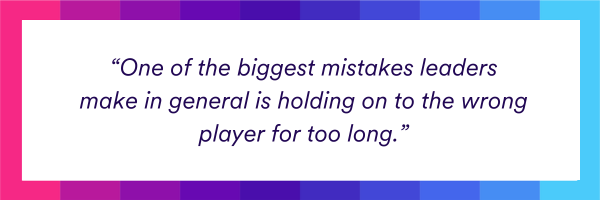
Product Development
Q: Who benefits from Athena Alliance, Inc.?
A: Individual women looking to advance from Sr. Director to Board Director, and all the steps in between. Also, entrepreneurs looking to build businesses to scale and need an ecosystem of support, wisdom, and learning around them.
Companies also benefit. We have an array of corporate customers including Sumo Logic, Barracuda Networks, Intuit, Quinstreet, Abbott, DFIN, GDIT, and many more. They support cohorts of women leaders (and in some cases all genders) through Athena’s highly tailored and future-forward leadership excellence programs.
Q: Why is this so important?
A: The world is moving so fast. Just consider the last 4 years – a global pandemic, wars in Europe, generative AI taking us by storm, social unrest hitting corporate culture and employee stability, globalization taking the workforce to new places and shapes, and so on. Leaders can’t learn from traditional models any longer – classes, boot camps, etc. are outdated as soon as they are formed. New models are needed to support leaders as they advance and lead in an ever-changing world.
And, women need a competitive advantage. Athena doesn’t offer anything the men don’t also need; we focus on women for two reasons – they deserve the competitive lift, and those without the power derived from how things are today are themselves the best suited to design the future for how things should be.
Q: What are some examples of companies leveraging Athena Alliance, Inc.?
A: So, so many – I mentioned some above, but we have many of the F1000 and top private companies represented across all industries. Databricks, Bank of America, Microsoft, Amazon, Meta, Pricesmart, Disney, Coveo, KAR Global, PNC, Cardinal Health and so on. Generally companies with at least 300 employees.
Q: What have you learned from your users and customers so far?
A: We work with senior leaders – Sr. Director and above. This generally follows an age bell curve, and our members tend to be in their later 30’s through early 60’s. They are moving into the “second-half career”. Women today will have 60-year careers. They aren’t going to retire after 30 years like their mothers. And, they are excited about this. They want their second half to have much more meaning, to be more of a portfolio where they may be in an operating role, while also investing, serving on boards, writing a book… and giving back to their community. They are a brand in and of themselves and they want to build a Portfolio of Impact™. Companies that understand this and support this will hold their top leaders much longer.
Scaling & Growth
Q: How do you build a strong company culture while scaling the business?
A: We are a remote-first company, with teammates all over the world. We make conscious efforts to get the right groups of us together live periodically to plan and align at the highest levels. On a daily basis, we are in Slack all the time, sharing, congratulating, laughing, checking in… across teams.
In this way, we work hard to make sure groups/teams don’t get stuck in their myopic view. We also have Athena Wisdom Exchange (AWE) every other Friday. We get together and just talk. Very rarely do we have a formal presentation in these sessions. The idea is to bring up what’s most pressing for the business and just talk about it.
Finally, when we see a challenge to culture, or to identity for the business we highlight it in the “watercooler” or the AWE to ensure everyone understands why we addressed that challenge as we did, or can weigh in if we’re not sure what to do.
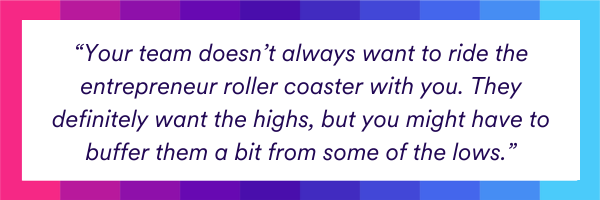
Fundraising
Q: How do you maintain strong relationships with your investors and optimize their contributions?
A: I invite our investors to the virtual Boardroom as they like – they can see whatever they want to of the board docs, and are welcome to request to sit in on a board meeting. I also take calls with them periodically as they like. And, I ask them to speak on our behalf. In this way, they get familiar with the business in their own 1st person, talking about us on LinkedIn, or on stages they get to present from, etc. I get to know where their social collateral is and ask them to leverage that on our behalf. We have about 20 individual investors on our cap table. I know who they are, and they know they can call me any time. I also often text with my investors. They simply reach out to ask how things are going and I tell them. Transparency is very, very important in our culture at Athena.
Q: What advice do you have to similarly situated founders as they begin fundraising?
A: Raise money thoughtfully from people and institutions you like. Steward the money in your bank account very closely and ensure you always have at least 9 months of runway on a cash flow basis. You can’t “budget” at an early stage; rather everything is about tradeoffs – if we spend here, we can’t spend there… which is more important to get us to the next milestone? Be careful growing your team (don’t be shy about using contractors to start), and know that in the early days, the team may need to change a lot. Not everyone can scale with you. Don’t let the outside world push you out over your own skis; take lots of guidance and advice from all the wise people you can find, but then use your own council as the final and best advice.
Essentially my advice in almost all ways would be the same as what I would say if you asked me for advice on building and raising a family. You are in it for the long haul. Build something that will last and be great! Then true success will come.
Team Building & Leadership
Q: What are your strategies for attracting and retaining talent?
A: Transparency and honesty are very important. People leave bosses, not companies. And, the two top stressors in a person’s life are their spouse and their boss (if they have them). It’s important to understand that core to the relationship are the role, money, and how you resolve conflict. I encourage people to examine roles as often as they need. Particularly at an early stage, job descriptions need to be fluid. I like to say – “Get the right people on the bus and don’t be afraid to let them move around a bit until they and you find their right seat.”
Second, I believe money conversations need to happen whenever they need to happen. Sometimes it’s me realizing I need to pay someone more, or that their value has diminished as their role changed in ways that maybe means they need to move on. Sometimes it’s them feeling their role has changed in ways that justify higher pay. I’m always willing to have an open conversation about pay and figure out together what is fair and right.
And third, you really have to get to know each individual at a conflict level. I’m not saying create conflict but be very attentive to where it surfaces, which sometimes people try really hard to hide. Sometimes you can’t see it, but you feel it. You have to follow that sense of “something isn’t quite right” and dig to find out what and why. We have so many cultural differences, not just at the macro level, but at the micro (different upbringings, and senses for what is ‘safe’ to say or address, and different triggers). Being vulnerable and able to say “I think we aren’t connecting here. Do you feel that too? What is it and what can we do about it?” This is crucial. The rest will follow if you have a great relationship in your team with great people, they will bring you more great people.
This also leads me to diversity – you have to start with a diverse team from the very beginning if you want to ensure you have one all along.
Q: What leadership skills do you believe are critical in the current environment?
A: A bit biased, but this program :). Leaders need to develop a really, really good ability to talk about difficult things. Society is penetrating the work environment like never before. We do not all think, believe, and see the world the same way, and at the same time, leadership is being asked to put stakes in the ground on societal issues at every turn. Much of the time the right answer will be a middle-of-the-road or no answer. In order to do that, leaders need to get good at discussing issues in a way that can be inclusive for all while not alienating those at the extremes.
Marketing & Branding
Q: How do you differentiate your brand from competitors?
A: We are practical, down-to-earth, actionable, and serious about advancement while building a better world. A business that services individuals must grow thoughtfully and more slowly than a pure SaaS business. And, that is what we have done. We realize that every member of Athena is a unique human and will need tailored and unique aspects of support. The same goes for every corporation we support. We are also definitively the only platform that integrates community, content, and coaching seamlessly and very, very deeply.
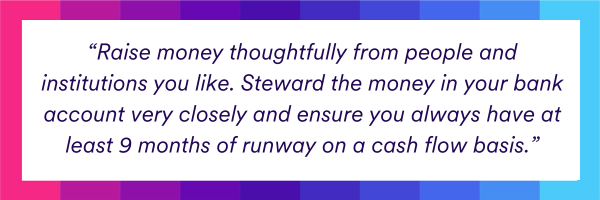
Challenges & Lessons Learned
Q: Can you share any specific lessons or mistakes you made during the startup journey and how you overcame them?
A: The biggest lesson is more of a broad experience. Getting product-market-fit right took a long time, and sometimes as that happens it can be very difficult to bring your community along with you. Keeping your early adopters close is key. They don’t always know where you should be headed, but if you build the right relationship with them, they will let you guide them too as you discover what they really need. We have a robust advisory board, and most of our investors are actually Athena members. This has been really powerful for us and our community.
One of the biggest mistakes leaders make in general is holding on to the wrong player for too long. This can be really damaging when you are small and every person has a big and noticeable impact. Out of respect I don’t want to talk about specifics here, but being able to be decisive in evoking your team – both new adds, and intentional parting of ways – is so important for everyone.
Lastly, I’ll say there have been a couple of times I’ve been too transparent. Your team doesn’t always want to ride the entrepreneur roller coaster with you. They definitely want the highs, but you might have to buffer them a bit from some of the lows. What you don’t want is widespread panic. An example I’ll give is the SVB bank run. We had all our money in SVB and we went from – “Oh no we lost everything” to “It’s all going to be ok” over the course of 3 days. I carried the team along on that throughout Slack “water cooler” and in retrospect, I should not have. I couldn’t hide what was going on – it was all over the news and the whole team knows who we banked with. But this was a case where I should have told the team “Give me the weekend to figure out what’s going on; I’ll come back to you Monday”.
Industry and Market Insights
Q: What is one significant trend or prediction that you believe will drive the transformation of work?
A: AI is changing everything in our business. To start, it’s making my team way more efficient across all realms that require any level of creative writing, summarizing, or deriving insight across multiple sources. This happens in pretty much every role. The more each individual gets comfortable with this, the more space is created for higher-order and new opportunities at the human level – for example, more space for leaders to engage in leading, and more space for individual contributors to evolve their own roles. It’s a scary, but also very exciting time.
Company Vision
Q: What’s next for you and Athena Alliance, Inc.?
A: I’m in it for the long haul – Athena all the way :). We wish to be the leader in leadership. We are looking for ways to include all genders, moving beyond just women starting with the ways we support corporate cohorts. People spend more than half their time at work. We want that to be a healthy, happy, productive, and fulfilling time. Change like that starts at the top, and our vision is of a world where leadership at the top of the organization is as diverse as society as a whole, and where leaders are able to nimbly keep up with the world around them, while not losing themselves in work.
Q: What would you like to say to People leaders who are thinking of using Athena Alliance, Inc.?
A: We strive to be the most engaged and meaningful partner you have in your efforts to support, advance, and grow top leaders. We are what we say we are.
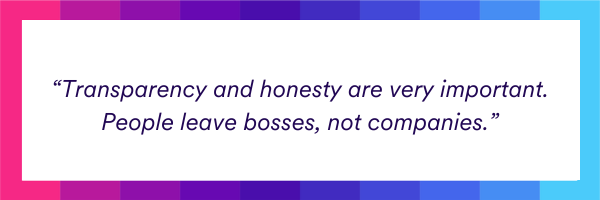
On a Personal Note
Q: Describe your perfect day when you aren’t working.
A: Being with my kids. I am blessed with two kids – a 22-year-old boy and an 18-year-old girl who really enjoy spending time with me. Between the two of them, I’m always able to get one of them on the phone or to do something fun. They are my everything!
Q: What is your personal mantra?
A: If you can help, you must help. That can be overwhelming sometimes and I don’t always live up to it. But, it’s a mantra in my consciousness at all times.
See other inspiring founder stories like Coco’s on the Transform blog.
